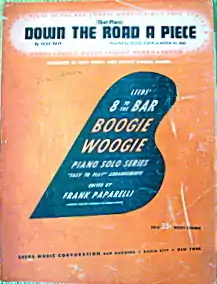Down the Road a Piece
"Down the Road a Piece" is a boogie-woogie song written by Don Raye. In 1940, it was recorded by the Will Bradley Trio and became a top 10 hit in the closing months of the year. Called "a neat little amalgam of bluesy rhythm and vivid, catchy lyrics,"[2] the song was subsequently recorded by a variety of jazz, blues, and rock artists.[3]
| "Down the Road a Piece" | |
|---|---|
 Sheet music cover | |
| Single by Will Bradley Trio | |
| B-side | "Celery Stalks at Midnight" |
| Released | 1940 |
| Recorded | August 12, 1940 |
| Genre | Boogie-woogie |
| Length | 3:10 |
| Label | Columbia (no. 35707)[1] |
| Songwriter(s) | Don Raye |
Original song
"Down the Road a Piece" was recorded in 1940 by members of the Will Bradley–Ray McKinley Orchestra as the "Will Bradley Trio" (a misnomer, as Bradley did not perform on the song, while a fourth, the song's writer, Don Raye, did, as well as an uncredited vibraphone player). Three musicians are mentioned in the lyrics:
The drummer man's a guy they call Eight Beat Mack
And you remember Doc and ol' Beat Me Daddy Slack
"Eight Beat Mack" refers to the drummer Ray McKinley, "Doc" refers to the bass player Doc Goldberg, and "Beat Me Daddy Slack" refers to the pianist Freddie Slack (a reference to "Beat Me Daddy, Eight to the Bar", a hit recorded earlier in 1940 by Slack with the Bradley–McKinley Orchestra). Vocals for "Down the Road a Piece" were provided by McKinley and Raye.
Lyrics
The original lyrics were used in cover versions by Harry Gibson and Stan Kenton, both in 1945, and the Glenn Miller Orchestra (led by Ray McKinley) in 1946, but subsequent recordings of "Down the Road a Piece" usually changed the lyrics that referred to the musicians. Amos Milburn recorded the song in 1946 and included the reference to "Eight Beat Mack" but changed the next line to "You remember me doggin' old Beat Me Daddy Slack." Ella Mae Morse sang the song in the early 1950s, deleting the references to Doc and Slack from the lyrics and replacing them with "Sam and Spider-Finger Jack", but keeping the reference to Eight Beat Mack, in spite of the fact that McKinley was not in the band, but Slack was. In 1956, Merrill Moore sang "Eight Beat Joe ... Beat Me Daddy Moe". Chuck Berry, who recorded the song in 1960, changed the lyrics further, replacing the musicians with "Kicking McCoy, you remember the old rubber legged boy." Berry's version was copied by Manfred Mann in 1964. The Rolling Stones in 1965 replaced Kicking McCoy with Charlie McCoy, probably a reference to Charlie Watts. Foghat, Brownsville Station, and Bruce Springsteen followed suit. Starting in the 1990s, however, most musicians began using the 1940 lyrics.
Influence
In his autobiography, Henry Mancini recalled that "Down the Road a Piece" inspired his "Baby Elephant Walk" for the 1961 movie Hatari!: "I looked at the scene [elephants walking to the watering hole] several times [and] I thought, 'Yeah, they're walking eight to the bar', and that brought something to mind, an old Will Bradley boogie-woogie number called 'Down the Road a Piece'... Those little elephants were definitely walking boogie-woogie, eight to the bar. I wrote 'Baby Elephant Walk' as a result".[4]
Numerous artists have recorded "Down the Road a Piece", sometimes with variations in the music. A partial list[2] includes Chuck Berry, Brownsville Station, Foghat, Harry Gibson, Joe Grushecky & the Houserockers with Bruce Springsteen, Stan Kenton, Jerry Lee Lewis, Manfred Mann, the Glenn Miller Orchestra, Amos Milburn, Merrill E. Moore, Ella Mae Morse, the Rolling Stones, and Chuck E. Weiss.
References
- Subsequently reissued as Columbia 36958.
- Eder, Bruce. "Don Raye – Biography". AllMusic. Retrieved March 12, 2011.
- "Down the Road a Piece – Search Results". AllMusic. Retrieved July 8, 2013.
- Mancini, Henry (2001). Did They Mention the Music? The Autobiography of Henry Mancini. Cooper Square Press. p. 109. ISBN 978-0-8154-1175-8.CS1 maint: ref=harv (link)
External links
- Chuck Berry version: Lyrics of this song at MetroLyrics